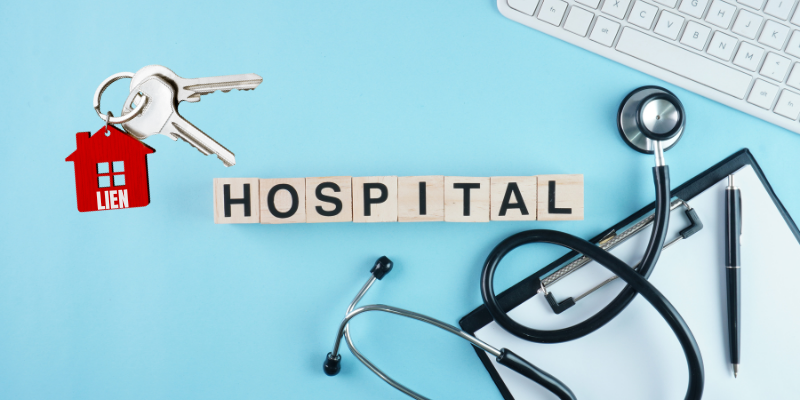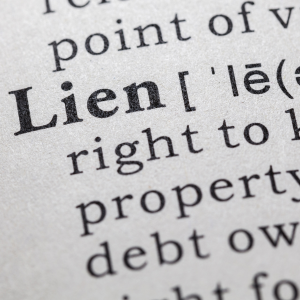
Understanding Hospital Liens: What You Need to Know
Understanding hospital liens is crucial for homeowners and real estate professionals navigating the Virginia property market. A hospital lien is a legal claim that hospitals can place on a patient’s settlement or judgment proceeds to recover unpaid medical bills.
In Virginia, these liens can affect real estate transactions if the homeowner has outstanding medical debts from hospital stays. It’s important for homeowners to be aware of any potential liens that may exist on their property, as they can complicate the process of selling or refinancing a home.
Hospital liens in Virginia are governed by specific statutes that outline how they can be applied and enforced. Understanding these laws helps homeowners protect their financial interests and ensures smooth real estate transactions.
Homeowners should consult legal experts familiar with Virginia’s hospital lien statutes to navigate any issues effectively and ensure all obligations are addressed prior to closing a deal on a property. If you’re unsure where to begin, 4 Brothers Buy Houses can help guide you through the selling process. Don’t hesitate to contact us for support in resolving lien-related concerns.
Legal Framework for Medical Liens in Virginia
In Virginia, the legal framework governing medical liens, particularly hospital liens, is crucial for homeowners to understand in order to protect their real estate assets. Under Virginia law, hospitals have the right to place a lien on a patient’s personal injury settlement or judgment to recover unpaid medical expenses.
This process is outlined in the Virginia Code, which specifies that hospitals must provide written notice of the lien to both the injured party and any insurance companies involved. The notice must include detailed information about the charges and treatment provided.
Homeowners should be aware that these liens can complicate real estate transactions if not addressed properly, as they may affect the clear title of a property. It is essential for individuals dealing with potential hospital liens to seek legal guidance to navigate this complex area of Virginia real estate law effectively.
Understanding how medical liens operate within this legal framework can help homeowners take proactive steps to safeguard their property from unforeseen financial encumbrances related to healthcare services received after injuries.
How Hospital Liens Affect Your Property Rights
In Virginia, understanding how hospital liens can impact your property rights is crucial for homeowners. A hospital lien allows healthcare providers to claim a portion of any settlement or judgment awarded to a patient following an accident, potentially affecting the financial interests tied to your real estate.
When a lien is filed, it attaches to the property owner’s assets, including their home, which can complicate refinancing or selling the property. This legal right empowers hospitals to ensure they receive payment for medical services rendered, but it can also impede the homeowner’s ability to manage their property freely.
The presence of a hospital lien on your property title can delay transactions and affect negotiations with potential buyers or lenders. To avoid lengthy complications and sell quickly, many homeowners consider working with a cash-for-houses company in Washington, DC, and nearby cities that can help navigate lien-related issues and close faster without traditional financing delays.
Steps Hospitals Take to File a Lien in Virginia

Hospitals in Virginia have specific procedures they follow to file a lien against a patient’s real estate when medical bills remain unpaid. First, healthcare facilities must ensure that the treatment provided was necessary due to an injury caused by another party’s negligence.
Once confirmed, the hospital typically notifies the patient about the outstanding debt and their intention to pursue a lien. The next step involves filing a memorandum of lien with the clerk of the circuit court in the jurisdiction where the treatment was administered or where the patient resides.
This document includes essential details such as the amount owed, dates of service, and patient information. To secure their claim legally, hospitals must adhere strictly to statutory deadlines, filing within 30 days after discharge or final treatment for non-emergency services.
In cases involving emergency care, hospitals may have up to 90 days post-discharge to file. Proper notification is crucial, as Virginia law requires that both patients and liable third parties receive written notice of any filed lien.
This process allows hospitals to assert their right to compensation while ensuring transparency and compliance with state regulations governing medical liens in Virginia real estate scenarios.
Protecting Your Home From Hospital Liens: Legal Options
Protecting your home from hospital liens in Virginia involves understanding the legal options available to safeguard your real estate assets. In Virginia, a hospital lien can be placed on your property if you fail to pay for medical services, potentially jeopardizing your home’s equity.
To protect against this, it’s crucial to familiarize yourself with the nuances of state lien laws and explore possible defenses. Consulting with an experienced attorney who specializes in real estate and healthcare law can provide valuable insights into negotiating settlements or disputing claims.
Additionally, Virginia residents should consider homestead exemptions, which may offer some protection by shielding a portion of their home’s value from creditors. Staying informed about payment agreements with healthcare providers and maintaining health insurance coverage are proactive measures that can prevent liens from arising in the first place.
Understanding these legal protections empowers homeowners to effectively manage their financial obligations while preserving their property rights against potential hospital liens.
Settlement Negotiations: Reducing or Removing a Hospital Lien
In Virginia real estate transactions, understanding how to manage hospital liens is crucial, particularly during settlement negotiations. When a hospital lien is placed against your property due to unpaid medical bills, it can complicate the process of selling or refinancing your home.
To effectively reduce or remove a hospital lien, it’s imperative to engage in strategic settlement negotiations with the lienholder. This involves reviewing the legitimacy and accuracy of the lien, ensuring that all medical services billed were indeed rendered and necessary.
By negotiating directly with the hospital or its legal representatives, you may be able to reach an agreement to lower the amount owed. Demonstrating financial hardship or providing evidence of other pressing obligations can strengthen your position.
Additionally, working closely with an experienced attorney familiar with Virginia’s lien laws can provide valuable insights into potential defenses and tactics for negotiation. Settlements might include payment plans or lump-sum reductions if negotiated skillfully, thus clearing the path for smoother real estate transactions without encumbrances from outstanding medical debts.
The Role of Health Insurance in Preventing Hospital Liens
Health insurance plays a critical role in safeguarding homeowners from hospital liens in Virginia real estate transactions. When individuals possess comprehensive health insurance coverage, medical expenses incurred due to illness or injury are typically covered, reducing the likelihood of hospitals seeking payment through liens on personal property.
In Virginia, hospitals may place a lien on a patient’s home if medical bills remain unpaid. However, robust health insurance often covers significant portions of these medical costs, thereby mitigating the risk of such liens being filed against a homeowner’s property.
By ensuring that most or all healthcare expenses are paid through their insurance policies, individuals can prevent the financial burdens associated with unpaid hospital bills and protect their real estate assets from potential claims. Consequently, maintaining adequate health insurance coverage is essential for Virginia residents to effectively shield their homes from hospital liens and preserve their financial stability during real estate dealings.
Financial Assistance Programs to Avoid Medical Liens

Navigating the complexities of financial assistance programs can be crucial in avoiding medical liens on your property in Virginia. Understanding the options available to you, such as Medicaid and charity care, can provide significant relief from hospital bills that might otherwise lead to a lien placed against your home.
Many hospitals offer financial assistance or sliding scale payment plans based on income, which can prevent the escalation of unpaid medical debts into liens. Additionally, Virginia state programs may provide aid for those facing financial hardship due to medical expenses.
Being proactive in communicating with healthcare providers about potential payment plans and exploring eligibility for federal or state-sponsored programs is essential to safeguarding your real estate from hospital liens. By taking these steps, homeowners can effectively manage medical debts and protect their assets.
Important Virginia Laws Impacting Hospital Liens on Homes
In Virginia, understanding the legal framework surrounding hospital liens is crucial for homeowners, as these liens can significantly impact real estate transactions. Hospital liens are claims hospitals place on a patient’s property to secure payment for medical services rendered.
Virginia law permits hospitals to attach such liens to a patient’s personal injury settlement or judgment if the patient fails to pay their medical bills. Homeowners must be aware of the specific statutes governing hospital liens in Virginia, particularly how these laws interact with real estate properties.
Certain protections exist under Virginia Code Section 8.01-66.2 and subsequent sections, which outline the procedures and limitations for enforcing hospital liens. For instance, there are provisions detailing the maximum amount that hospitals can claim from a settlement or judgment, ensuring it does not exceed reasonable charges for care provided.
Additionally, these laws require hospitals to file their lien notices promptly with local courts to establish priority over other potential creditors. Understanding these nuances helps homeowners navigate potential encumbrances on their property and take proactive steps to manage hospital debts effectively without jeopardizing their home’s equity or complicating future sales transactions.
How Bankruptcy Affects Existing Hospital Liens on Property
Filing for bankruptcy can significantly impact existing hospital liens on your property in Virginia, providing a potential avenue for relief when a homeowner declares bankruptcy. An automatic stay is typically issued, which temporarily halts all collection activities, including those related to hospital liens.
In a Chapter 7 bankruptcy, the debtor’s non-exempt assets are liquidated to pay off creditors, but many personal properties are protected under state exemptions. However, if the property has significant equity beyond these exemptions, the lien may still be enforced unless it is specifically avoided through legal processes such as lien avoidance motions.
Conversely, in a Chapter 13 bankruptcy, homeowners might restructure their debts into manageable payments over three to five years, potentially allowing them to address hospital liens systematically through the repayment plan. It is crucial for homeowners in Virginia to understand how their unique circumstances and the type of bankruptcy filed will influence existing hospital liens on their real estate assets and seek legal guidance to navigate this complex process effectively.
Frequently Asked Questions About Virginia’s Lien Laws
Understanding Virginia’s lien laws is crucial for homeowners concerned about potential hospital liens on their real estate. In Virginia, a hospital lien allows medical providers to claim a portion of the settlement or judgment awarded to an injured party from an accident, ensuring that healthcare costs are covered.
Homeowners often have questions about how these liens can affect their property and what protections are in place. One common question is whether a hospital lien can be directly placed on their home; typically, this type of lien attaches to settlement proceeds rather than the property itself.
However, understanding the legal nuances in Virginia is essential, as it may involve specific timeframes within which hospitals must file their liens to make them valid. Another frequent inquiry revolves around whether all medical providers can impose such liens or if it’s limited to particular institutions; generally, hospitals and certain emergency services are eligible, but it’s important to verify the specifics under Virginia law.
Homeowners also wonder about the priority of these liens compared to other claims against their assets. Hospital liens usually take precedence over unsecured debts but might be subordinate to mortgages or pre-existing security interests. If you’re dealing with complex lien issues and need to sell quickly, working with a company that buys homes in Virginia and nearby cities can help simplify the process and avoid traditional delays
What Does It Mean When a Hospital Files a Lien Against You?

When a hospital files a lien against you in Virginia, it means that the hospital is asserting a legal claim to a portion of any settlement or judgment you might receive from a personal injury lawsuit. This process typically occurs when you have received medical treatment following an accident and have outstanding medical bills.
The hospital lien acts as a financial safeguard for the healthcare provider, ensuring they are compensated for services rendered. In Virginia real estate law, understanding how these liens function is crucial, especially if you’re involved in real estate transactions while dealing with unresolved hospital debts.
Essentially, a hospital lien can affect your property by attaching itself to any potential compensation before you receive the funds. This means that satisfying the lien becomes necessary to clear any encumbrances on your property title.
Therefore, comprehending the implications of hospital liens in Virginia helps protect your assets and ensures smooth real estate dealings without unexpected financial hindrances.
Can hospitals take your home because of unpaid medical bills?
In Virginia, it is important to know how hospital liens function if you are a homeowner worried about the exposure of medical debts for real estate property. A hospital lien allows a medical facility to claim a portion of any settlement or judgment related to an injury for which the hospital provided care.
A point, however, remains that hospitals cannot take your home directly because you owe them money. Virginia laws protect homestead principles, which means primary residences are safe from hospitals trying to take homes as collateral against pending debts.
Homeowners need to be informed that although personal possessions can be claimed after losing a lawsuit and a judgment occurs, primary dwelling places tend to be protected under Virginia homestead exemption laws. It is best to talk with someone knowledgeable in real estate and health care liens to help navigate these issues so that, during financial strain due to… medical bills, the house would stay unharmed
Who Can Place a Lien on Your House in Virginia?
Knowing who can place a lien on your house is case-specific in Virginia. As an example, consider hospital liens, which emanate from claims made by medics who want to secure payment by placing a lien on the patient’s estate.
This means that if you receive treatment at a hospital in Virginia and fail to clear your medical bills, hospitals can file for a lien against your property. But this does not stop with hospitals only.
Even contractors, subcontractors, and suppliers can place mechanics’ liens due to unpaid work or overdue supplies during home enhancements. Also, government bodies are allowed to place tax liens if the property taxes go unpaid.
All these different types of liens need to have awareness, especially when dealing with real estate in Virginia, as all could affect the legal ownership of the property and complicate matters of selling or refinancing the house. Proactive approaches towards debt payments, along with knowing what rights are available under Virginia laws, mitigate risks towards unanticipated notices of claim on one’s estate property.
How to Remove a Hospital Lien?
In Virginia, if you have a real estate hospital lien, it is important to know how to remove it. To eliminate a hospital lien, the first step is getting an itemized statement of the lien from the billing department of the hospital.
Be certain that all accounts are accurate and related to services rendered for the treatment of injuries incurred from an accident due to another party’s negligence. Interventions can help here; many times, an adjustment to the lien or its settlement is possible inside or outside of insurance coverage terms with the hospital directly or via your insurer.
If there are alleged charges without supporting evidence, prompt action on these charges is critical. Retaining counsel who practices in Virginia on real estate and personal injury matters can be very helpful in executing this process optimally.
Also, ask if there have been any transactions on the account balance that are not recorded and hence not updatable. Following completion, the guarantee sought from the hospital must be granted as stated, whereby no records will remain indicating inconvenience has been caused by undertaking any lying or surrendering titles during property history cleansing.
Need to sell your home? For a fast sale, skip expensive repairs or prefer an effortless process. 4 Brothers Buy Houses can assist you. We provide fair cash offers, deal with the paperwork, and ensure smooth execution. Prepared to sell or need clarification? Reach out at 202-601-4928 for a risk-free offer. Get started today!
Helpful Virginia Blog Articles
- Best Season For Selling Your Home In Virginia
- Your Home’s Protection Against Hospital Liens In Virginia
- Quickly Sell Your Virginia Home And Relocate Stress-free
- Squatter Challenges When Selling Your Virginia Home
- Essential Guide To Short Selling Your House In Virginia
- Can My Spouse Legally Sell Our Home In Virginia Without Consent
- Selling A Hoarder House In Virginia’s Real Estate Market
- Closing Fees Without An Agent In Virginia
- Sell My Flooded House In Virginia
- Selling An Estate Home In Virginia

| STATE OF VIRGINIA | HEALTH CARE | NURSING | NURSE | UNINSURED | INSURERS |
| POLICYHOLDERS | THE COMMONWEALTH | COMMONWEALTH | BORROWERS | DEBTORS AND CREDITORS | BANKRUPTCY PROTECTION |
| HEALTH INSURERS | CIVIL ACTION | CORPORATION | HEALTH CARE PROVIDER | PERSONAL INJURIES | NURSING HOME |
| MONEY | CODE OF VIRGINIA | PHYSICAL THERAPY | PHYSICAL THERAPIST | JUDGMENTS | FORECLOSURE |
| FORECLOSED | DEPARTMENT OF MEDICAL ASSISTANCE SERVICES | COLLECTION AGENCY | CREDIT SCORES | REAL ESTATE OWNED | |
| PLAINTIFF | CLAIMANT | STATUE OF LIMITATIONS | REAL PROPERTY | POLICY | MEDICARE |
| TITLE XIX | DEBT FORGIVENESS | DEBT RELIEF | WAGES | TERMS OF USE | PRIVACY |
| PHARMACEUTICAL | LOANS | LIABILITY | INVOICES | UNDERINSURED | GARNISHING WAGES |
| WAGE GARNISHMENT | COURT CLERK | CHILDREN | BUDGET | AUTODIALER | THE CODE OF VIRGINIA |
